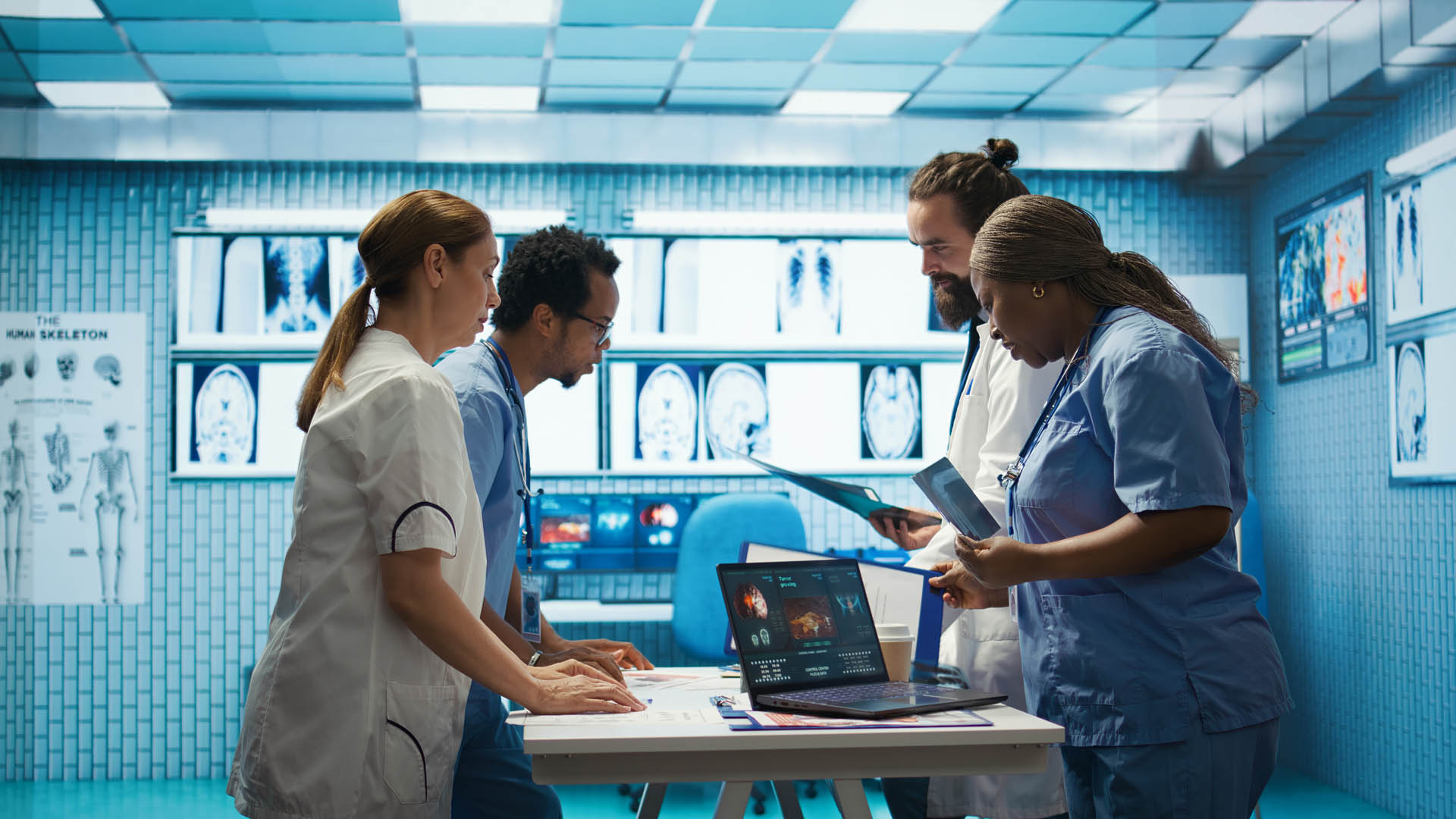Artificial intelligence is deepening our core understanding of biological systems and advancing the applications of modern medicine. At the Perelman School of Medicine, researchers are leveraging AI to identify genetic predictors of disease, improve healthcare practices, analyze population health trends, tailor personalized treatments, and beyond.
Research
Research
AI is transforming translational research by accelerating the journey from bench to bedside. By integrating vast datasets from genomics, imaging, clinical trials, and electronic health records, Perelman School of Medicine researchers are working to discover ways in which AI enables faster identification of biomarkers, predictive modeling of disease progression, and personalized treatment strategies. Through Machine learning algorithms, investigators are uncovering hidden patterns that inform drug discovery and optimize clinical decision-making. As our research continues to evolve, its role in bridging the gap between laboratory findings and real-world medical applications is becoming indispensable—paving the way for more precise, efficient, and patient-centered healthcare solutions.
AI is transforming clinical science by enhancing diagnostic accuracy, streamlining workflows, and personalizing patient care. From predictive analytics in disease progression to intelligent image analysis in radiology and pathology, AI enables clinicians to make faster, more informed decisions. It also supports drug discovery, clinical trial optimization, and real-time monitoring of patient data. As AI systems continue to evolve, they hold the promise of improving outcomes, reducing costs, and reshaping the future of healthcare with greater precision and efficiency.
AI is transforming Population Science by enabling deeper insights into the complex dynamics of human populations. By analyzing large-scale datasets—from electronic health records to social media trends and census information—AI helps researchers identify patterns, predict outcomes, and inform policy decisions with unprecedented speed and accuracy. Whether modeling disease spread, optimizing resource allocation, or uncovering social determinants of health, AI is becoming an essential tool in understanding and improving the well-being of populations worldwide.
AI is revolutionizing health care delivery by enhancing diagnostic accuracy, personalizing treatment plans, and streamlining administrative processes. From predictive analytics that anticipate patient deterioration to AI-driven imaging tools that detect diseases earlier and more precisely, AI empowers clinicians to make faster, more informed decisions. It also supports remote care through virtual assistants and chatbots, improving access and engagement. As AI continues to evolve, it holds the promise of more efficient, equitable, and patient-centered care—transforming how health services are delivered and experienced.
Artificial intelligence is deepening our core understanding of biological systems and advancing the applications of modern medicine. At the Perelman School of Medicine, researchers are leveraging AI to identify genetic predictors of disease, improve healthcare practices, analyze population health trends, tailor personalized treatments, and beyond.
AI is transforming translational research by accelerating the journey from bench to bedside. By integrating vast datasets from genomics, imaging, clinical trials, and electronic health records, Perelman School of Medicine researchers are working to discover ways in which AI enables faster identification of biomarkers, predictive modeling of disease progression, and personalized treatment strategies. Through Machine learning algorithms, investigators are uncovering hidden patterns that inform drug discovery and optimize clinical decision-making. As our research continues to evolve, its role in bridging the gap between laboratory findings and real-world medical applications is becoming indispensable—paving the way for more precise, efficient, and patient-centered healthcare solutions.
AI is transforming clinical science by enhancing diagnostic accuracy, streamlining workflows, and personalizing patient care. From predictive analytics in disease progression to intelligent image analysis in radiology and pathology, AI enables clinicians to make faster, more informed decisions. It also supports drug discovery, clinical trial optimization, and real-time monitoring of patient data. As AI systems continue to evolve, they hold the promise of improving outcomes, reducing costs, and reshaping the future of healthcare with greater precision and efficiency.
AI is transforming Population Science by enabling deeper insights into the complex dynamics of human populations. By analyzing large-scale datasets—from electronic health records to social media trends and census information—AI helps researchers identify patterns, predict outcomes, and inform policy decisions with unprecedented speed and accuracy. Whether modeling disease spread, optimizing resource allocation, or uncovering social determinants of health, AI is becoming an essential tool in understanding and improving the well-being of populations worldwide.
AI is revolutionizing health care delivery by enhancing diagnostic accuracy, personalizing treatment plans, and streamlining administrative processes. From predictive analytics that anticipate patient deterioration to AI-driven imaging tools that detect diseases earlier and more precisely, AI empowers clinicians to make faster, more informed decisions. It also supports remote care through virtual assistants and chatbots, improving access and engagement. As AI continues to evolve, it holds the promise of more efficient, equitable, and patient-centered care—transforming how health services are delivered and experienced.






